It can't stay unresolved
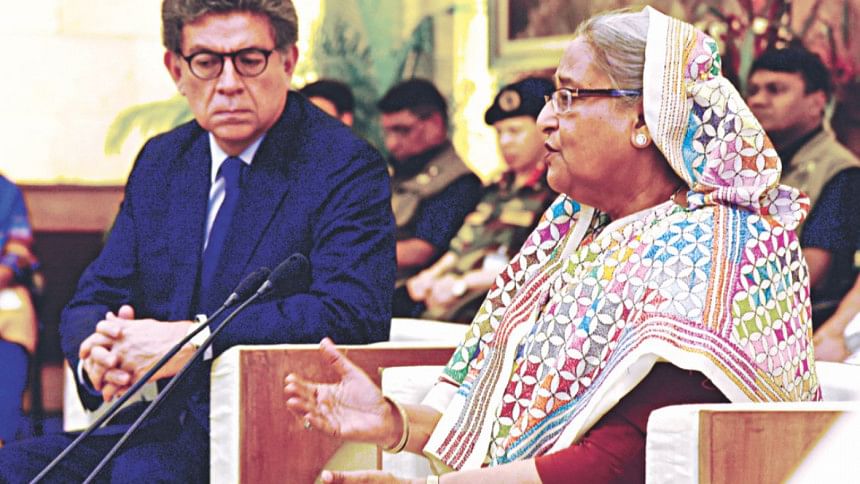
The visiting UNSC delegation yesterday said the Rohingya situation cannot remain without a solution and that it would find ways to speed up the implementation of the deal signed between Bangladesh and Myanmar for a safe and dignified repatriation of the refugees.
After the signing of the pact on November 23 last year in Naypyidaw, foreign affairs and migration experts said the stringent verification conditions in the deal may obstruct smooth return and prolong the repatriation process.
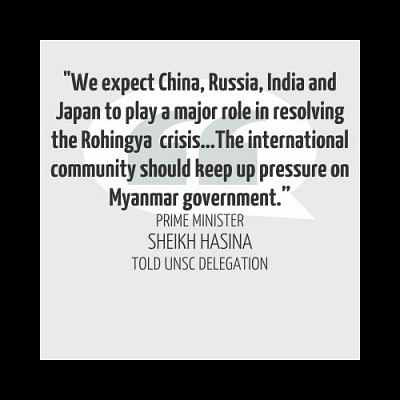
Especially, the requirement of identification documents has been a contentious issue for the Rohingyas since their citizenship was scrapped in 1982. Besides, most refugees say they have lost necessary papers as their homes were burned.
"The message we are conveying to Myanmar, to refugees and to the rest of the world that we are determined to find an end and a solution to the crisis,” said the delegation.
“After going back to New York, we will try to explain the ways and means to speed up the implementation of the agreements signed between Bangladesh and Myanmar.”
Mansour Ayyad Al-Otaibi, Kuwait's permanent representative to the UN, on behalf of the delegation said, “This is a humanitarian crisis and human rights issue. What we saw is not acceptable. We want to see a solution for that.
"The situation cannot remain without a solution and the message that we are conveying to Myanmar, to refugees themselves, to the rest of the world, (is) that we are determined to find a solution to this crisis."
Briefing the press at Hazrat Shahjalal International Airport before leaving for Myanmar, he also said, "All parties should show commitment to solve it as soon as possible. We cannot remain silent about it."
Al-Otaibi, whose country helped organise the tour with fellow council members Britain and Peru, further said the Security Council would "try to explore ways and means to speed up implementation of the [repatriation accord] signed between Bangladesh and Myanmar for safe, free, voluntary and dignified return of the refugees”.
Earlier in the morning, the delegation led by Peru's Permanent Representative Gustavo Meza-Cuadra Velásquez called on Sheikh Hasina at her official residence, the Gono Bhaban, where the Bangladesh premier said the repatriation has to be done under the UN supervision.
"The repatriation of the Rohingya people will have to be ensured under the UN supervision," she said and once again urged the international community to continue mounting pressure on Myanmar to take back its one million nationals.
"Myanmar should act in accordance with the agreement they have signed with Bangladesh [regarding the repatriation of the Rohingyas]," she added.
Under the November deal, refugees have to fill in forms with names of family members, evidence of their residency in Myanmar, birth dates, and a statement of voluntary return.
It stated that the repatriation would start within two months since the signing of the agreement, but five months have elapsed and the Myanmar authorities so far verified only 711 persons out of the first list of 8,032 refugees handed over to them by Dhaka.
International rights groups and various regional and global organisations have raised concerns over the repatriation process. They questioned where the persecuted minority will be resettled since hundreds of their villages have been razed and how their safety will be ensured in a country with raging anti-Muslim sentiment.
The Kuwaiti permanent representative, however, said they are not expecting any “easy” and “quick” solution and “all parties should show commitment to solve the problem as soon as possible”. It needs time and he did not want to raise expectations too high.
Addressing the pre-departure briefing at the airport, Al-Otaibi reiterated that they cannot remain silent about the crisis and said the issue would remain at the top of the UNSC agenda.
He was flanked by UK's Permanent Representative Karen Pierce and Peru's Gustavo Meza-Cuadra Velásquez. The UNSC team, which arrived in Bangladesh on Saturday, visited Rohingya camps the next day to have a first-hand account of the situation.
In reply to a question, the Kuwaiti envoy said he does not see any resistance from China and Russia. “They are the members of the Security Council and they are with us. You heard them yesterday and today they met the prime minister and they also want a solution to the crisis.”
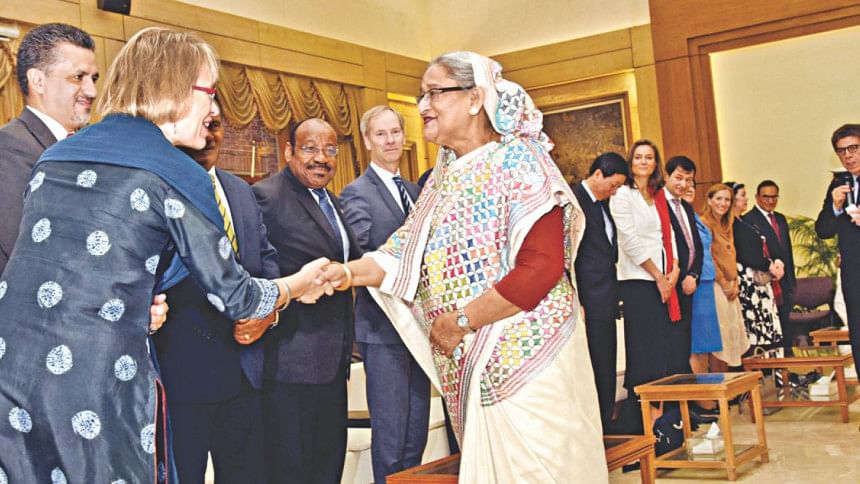
At this point, delegation leader Gustavo said the UNSC is united on the Rohingya issue and the visit is supported by all members of the body.
Replying to a question about the slow progress towards a solution to the crisis, he said the visit was part of their efforts to speed it up.
“We have been concerned that things are going slow. Also the secretary general has appointed a special envoy. So things are happening now and we will continue our discussion,” Gustavo said, adding that this will remain a top priority once they return to New York.
Responding to a query, Kuwait ambassador said no one is protecting anyone but they want to see the international obligation is met. Hopefully, he added, the agreement signed between Bangladesh and Myanmar will be implemented.
He highly appreciated Bangladesh's generosity, saying the people of this country opened their doors and hearts for around a million Rohingyas.
Asked whether they would back any move by the International Criminal Court to hold Myanmar accountable for the atrocities against Rohingyas, Al-Otaibi said both Myanmar and Bangladesh are parties to many international conventions and there are international laws for crimes against humanity which everybody will abide by.
“We heard that the ICC has adopted a move and they have started a fact-finding mission but the Security Council is different as it deals with peace and security.”
At this point, Karen Pierce said it needs to have a proper judicial and quasi-judicial investigation with proper evidence and then a proper follow-up to be able to make the determination in law.
“The fact-finding missions do not do that, they collect evidence, they make an assessment. But this is not a legal determination whether or not we can get an accountability mechanism. So, it is very difficult in the Security Council for reasons you know well.”
However, she said the Myanmar authorities have started their own investigation. “We may feel that is too little, too late, but we want to talk to the Myanmar authorities about it, how they see accountability in this case and try to explore what might be done beyond that.”
The departure of the UNSC delegation was delayed for nearly about two hours due to inclement weather and it left Dhaka for Naypyidaw around 12:50pm. The delegation will submit its report once they go back to New York after wrapping up the visit on May 2.
'KEEP UP THE PRESSURE ON MYANMAR'
"We expect China, Russia, India and Japan to play a major role in resolving the crisis," Hasina said at the meeting, reports UNB.
PM's Press Secretary Ihsanul Karim later briefed reporters.
He said the prime minister appreciated the international community as it extended support to Bangladesh. She also put emphasis on implementation of the Annan Commission's recommendations on the Rohingya issue.
"The international community should keep up the pressure on the Myanmar government in this regard," she said, adding Bangladesh does not want any conflict and it is trying to have a peaceful resolution to the problem.
Hasina said her government has already carried out the biometric registration of the Rohingyas who entered Bangladesh amid atrocities by Myanmar law enforcement agencies. "Due to the influx of the Rohingyas, the local Bangladeshis are enduring serious sufferings in the area."
The environment as well as forests of the particular area is getting affected seriously due to this huge influx. In the upcoming monsoon, the prime minister said, the sufferings of the Rohingyas will intensify further. That is why Bangladesh has prepared Bhashan Char Island to relocate 100,000 Rohingyas, she mentioned.
During the meeting, US representative Kelly Currie highly appreciated the prime minister's role, saying she has raised a level for all creating a new international standard by working from a humanitarian point of view.
Chinese representative Wu Haitao said Beijing will continue playing a constructive role on the Rohingya issue, while Russian representative Dmitry Polyanskiy assured of extending Moscow's support to Dhaka for a sustainable solution to the crisis.
'FRUSTRATING'
Legal and international relations experts, however, said it would be frustrating if the UNSC banks on the bilateral deal between Bangladesh and Myanmar instead of taking concrete actions to address the root causes of the Rohingya crisis.
Prof CR Abrar of Dhaka University said the latest crackdown has been the most violent and is tantamount to ethnic cleansing and genocide, and the global community must act strongly for a permanent solution.
“The most important aspect of a sustainable return is granting citizenship to the Rohingyas, ensuring their basic rights and creating safe conditions in Rakhine State,” said Prof Abrar, also executive director at the Refugee and Migratory Movements Research Unit at Dhaka University.
The other issue is holding accountable the perpetrators of the genocide against the Rohingya. It is the UNSC that can play the major role in holding Myanmar security forces accountable, he said.
“If it fails to do that, it would be totally frustrating for the humanity and global peace and security.”
The atrocities committed by the Myanmar security forces are not a bilateral issue, rather an international one. So, it has to be referred to the International Criminal Court, Prof Abrar said.
Prof Mizanur Rahman of DU law department said quick repatriation of the Rohingya is very important, but holding the Myanmar army accountable is of utmost importance at the same time.
“It is unacceptable that the perpetrators, after genocidal acts, would remain unpunished because of political and economic interests of some countries. This will remain as an example of injustice,” he said.

 For all latest news, follow The Daily Star's Google News channel.
For all latest news, follow The Daily Star's Google News channel. 


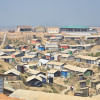




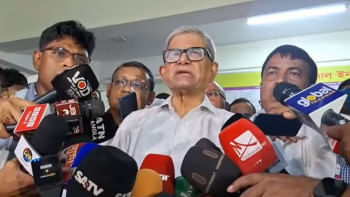
Comments